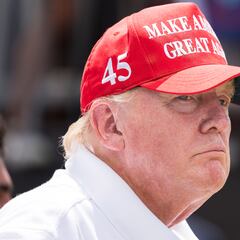Donald Trump indictment: Is the tax policy in NY different from the rest of the country?
Donald Trump and his business have been under scrutiny from authorities for bookkeeping practices that reduced taxes. How is New York tax policy different?


Donald Trump has been indicted by a New York grand jury convened by the Manhattan District Attorney Alvin Bragg, with charges likely revolving around bookkeeping fraud related to hush money payments to Stormy Daniels. The exact charges will be under seal until he is arraigned on Tuesday.
But this is not the only legal jeopardy over bookkeeping at his business that the former president currently faces in New York. In September the Attorney General Letitia James filed a civil lawsuit against the Trump Organization and Trump alleging that they misled banks and tax authorities. So is there something special about New York tax laws, are they different from the rest of the nation?
Is the tax policy in New York different from the rest of the country?
The tax systems in each of the 50 states, territories and the District of Columbia have their differences on what gets taxed and by how much and they are completely separate from the federal tax code. However, they all have in common that tax evasion is prosecuted as could be the alleged case of Trump and the Trump Organization “cooking the books” so to say.
The degree of the crime can vary though, from a misdemeanor to a felony depending on the type and level of financial fraud perpetrated, but tax evasion is generally considered a felony. In the case brought by the Manhattan DA, it’s reported that Trump is facing around two dozen charges, including felonies. A felony conviction for tax evasion could carry a punishment of up to five years in prison in New York.
Who are the key players in the Trump hush money case and indictment? https://t.co/BmGdaHg9kC pic.twitter.com/Kl9zK5yrOV
— The Last Word (@TheLastWord) March 31, 2023
Trump’s family business was already found guilty of felony tax fraud and other charges for giving top executives perks off the books. The State Supreme Court judge in Manhattan fined the company the maximum amount of $1.6 million.
One of the executives that orchestrated the scheme, Allen Weisselberg, the chief financial officer, was sentenced to serve five months at the Rikers Island jail. As part of the plea deal to reduce what could’ve been a lengthy sentence he agreed to testify against the Trump Organization.
Trump Organization barred from transferring assets without court permission
The same day that New York Attorney General James filed her civil lawsuit against Trump and his company, her office saw that a new company called “Trump Organization II LLC” registered with the New York Secretary of State. That company was incorporated in Delaware just the week before.
The NYPD is preparing for lower Manhattan to become the epicenter of an ongoing legal and political earthquake as the historic prosecution of former President Trump transitions into its next phase.@GarrettHaake has more on the case and possible protests. pic.twitter.com/pj1BT6jwOw
— NBC Nightly News with Lester Holt (@NBCNightlyNews) March 31, 2023
She asked a judge to bar Trump from moving his assets and businesses to a new holding company, fearing the state would have difficulty retrieving any money should it win in court. That request was granted, but why did the Trump organization pick Delaware?
Related stories
Most likely the same reason many companies do, the state has a corporate-friendly environment and one of those revolves around tax liability. The state does not impose state income tax on businesses that do not operate within the state.
Likewise, by changing his residency to Florida, Trump doesn’t have to pay income tax in the Sunshine State, it’s one of eight states without income tax. However, that doesn’t mean that he would necessarily be able to get out of paying income taxes, personal or for his businesses, in New York.

